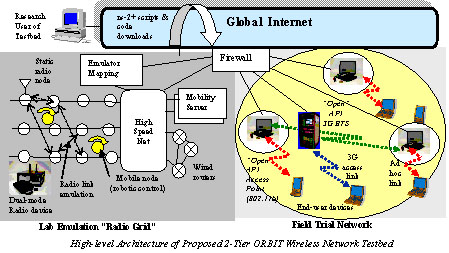ORBIT - Wireless Network Testbed
Project Objectives:This collaborative project is focused on the creation of a large-scale wireless network testbed which will facilitate a broad range of experimental research on next-generation protocols and application concepts.
Technology Rationale:
It is recognized that powerful
technology and market trends towards portable computing and
communication imply an increasingly important role for wireless
access in the next-generation Internet. At the same time, new sensor
and pervasive computing applications are expected to drive
large-scale deployments of embedded computing devices interconnected large-scale deployments of embedded computing devices interconnected
via new types of short-range wireless networks. The speed of
technology innovation in the wireless networking field can be
significantly increased with the development of a flexible,
open-access wireless network testbed that can be shared by
experimental researchers across the networking community.
Technical
Approach:
The
proposed ORBIT (Open Access Research Testbed
for Next-Generation Wireless Networks) system is a
two-tier laboratory emulator/field trial network testbed designed to
achieve reproducibility of experimentation, while also supporting
evaluation of protocols and applications in real-world settings. In
particular, the laboratory-based wireless network emulator will be
constructed using a novel approach involving a large two-dimensional
grid of static and mobile 802.11x radio nodes which can be
dynamically interconnected into specified topologies with
reproducible wireless channel models. All radio devices in the
system provide open API’s that permit end-users to download radio
link, MAC and network layer protocols to construct a specific
networking scenario. Once the basic protocol or application
concepts have been validated on the lab emulator platform, users can
migrate their experiments to the field trial network which provides
a configurable mix of both high-speed cellular (3G) and 802.11x
wireless access in a real-world setting. Extensive measurement
tools will be provided to support research evaluation, including
both network traffic and radio link/spectrum usage aspects.

The ORBIT research team will also carry out a comprehensive set of “experimental work packages” intended to generate system requirements and serve as end-user application drivers for the testbed being developed. The topics covered include ad-hoc 802.11 networks, security, location-aware services, VoIP, intelligent middleware, multimedia services and pervasive computing.
Results
to Date and Future Work Plan:
A $5.45M/4yr grant for the ORBIT project has been
awarded by the NSF under the Networking Research Testbeds (NRT)
program, with a start date of Sept 2003 .
The project is a collaborative effort
between several university research groups in the NY/NJ region:
Rutgers, Columbia, and Princeton, along
with industrial partners Lucent Bell Labs, IBM Research and
Thomson. The wireless network testbed will be developed and
operated by Rutgers WINLAB, using facilities located at the Rutgers
New Brunswick campus and at partner sites in the area. The testbed
will be available for remote or on-site access by other research
groups nationally. Additional research partners and testbed
equipment/software contributors will be actively sought from both
industry and academia during the course of the project.
For more detail, please see the following presentation: